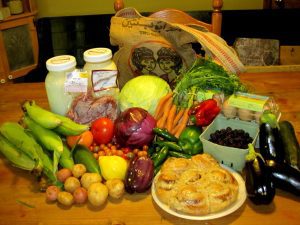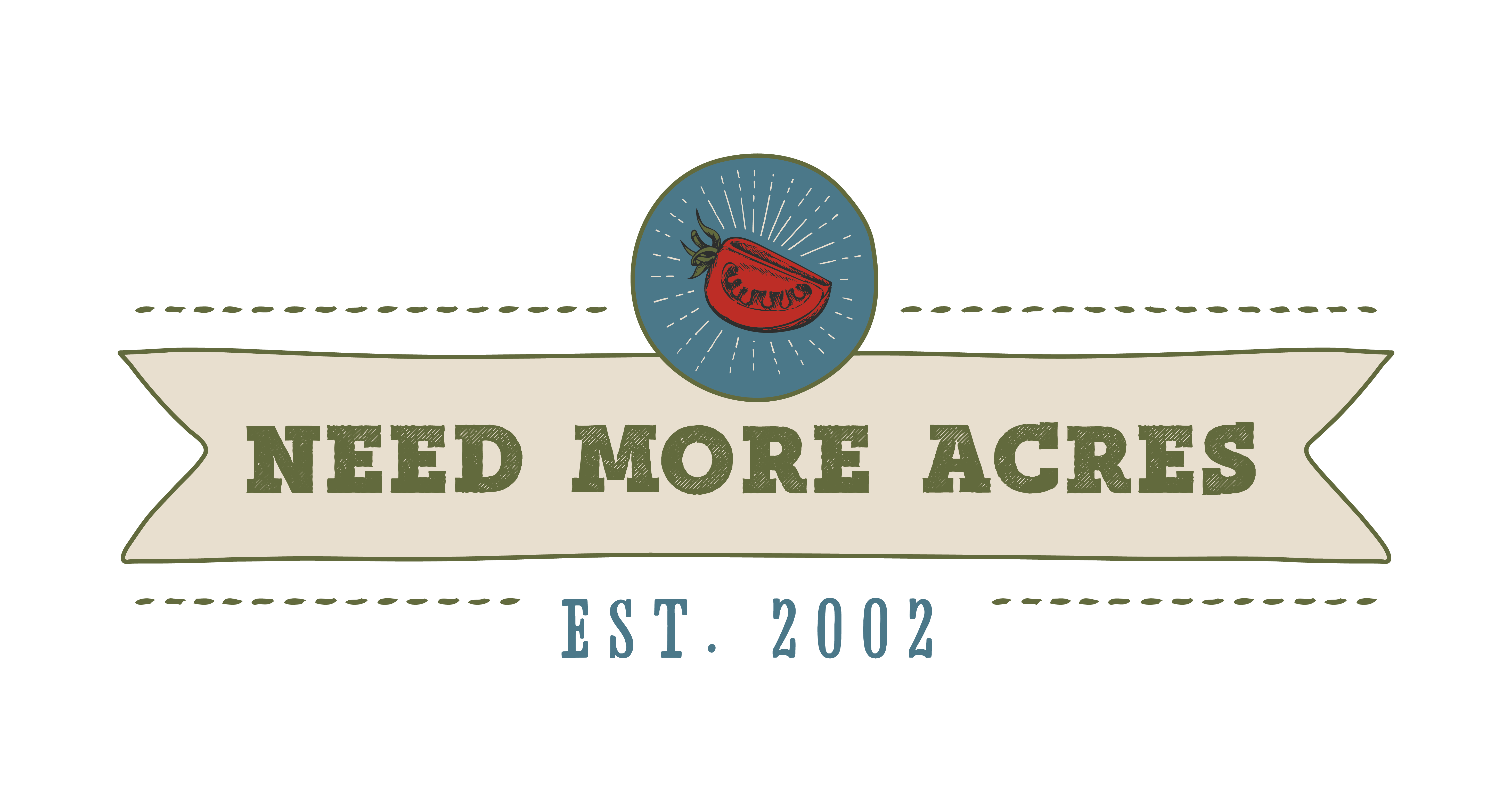
Many of the foods we were eating left us full and satisfied for a short period of time but we were hungry and snacking a lot in between meals. By evaluating our diet we realized that the meals we expected to be ready in 60 seconds were high in saturated fat, sugars and salts. Replacing those with foods that were nourishing and healthy for us actually decreased the amount of foods we were eating, we felt better and life became simpler.
Defining Real Food
Whole foods in their most natural state including fruits, vegetables, milk, whole grains, seafood, meats.
Natural sweeteners like honey, maple syrup and all natural fruit juice.
Snacks like dried fruit, seeds, nuts, and popcorn
Beverages like water, milk, all natural juices, coffee & tea.
Photo 1 A week’s worth of food purchased at Community Farmers Market in Bowling Green. Items include: Fresh fruits and vegetables, berries, meats, eggs, breads and milk.
Those extras at the grocery store may seem like a good deal when priced individually. But take into account what they add to your weekly budget and the fact that many kids will eat less of their “real” meals and you realize you aren’t really saving much. Here is an example of what the extras used to cost us each week:
Juice Boxes, 2 Bags of Chips, Breakfast Bars (or energy bars), Fruit Snacks, 12 pack of Coke, 2 Cans of Condensed Soup, Frozen Pizza, Corn Dogs, and a box of cookies Total Cost: $35 + (often much more)
Simplify Breakfast, Lunch & Snacks
The most important thing I did for our budget was to get control of our breakfast, lunch and snacks. This is where I was seeing the most over consumption and waste of food for our family. Walking the cereal aisle at the store proves that we are used to a wide variety of options for breakfast! But the truth was that with a little self-control we were able to minimize our options at home and save time, money and waste.
Here is an example of a week’s groceries for the first two meals of the day, including snacks (for a family of 6).
Breakfast (Cereal, Oatmeal, Eggs, Smoothies)
Grocery list: Coffee, Milk, Oatmeal, Cereal, Eggs, Orange Juice, Spinach, Bananas $22
Lunch (Sandwiches, Wraps, Sliced Fruits/Vegetables)
Grocery list: Sliced Bread, Wraps, Chicken, Beef, Sliced Cheese, Peanut Butter, Fruit $32
Snacks (fruits & vegetables, Protein “grab and go”)
Grocery list: Apples, Oranges, Pears, Grapes, Peaches, Bananas, Carrots, Dried Fruit, Mixed Nuts, Hard Boiled Eggs, Peanut Butter $28
Managing Dinner
When you are buying in bulk, stocking up on in-season fruits and vegetables and learning to use what you have on hand you are able to save money through eating dinner at home more often. Take into account that most families will only need a freshly prepared meal 3-4 days a week and that there is often leftovers! I’m listing a few of our go-to meals that help us save time and money.
Italian Night-Start with a base of homemade spaghetti sauce (or a healthier store bought option) and expand to one of these: Chicken or Eggplant Parmesan, Ground Beef Spaghetti, Sausage Spaghetti, Lasagna, or Pizza Night $12
Crock-pot Meals-Start with a good cut of grass fed beef, chicken or pork. Add a couple cups of chicken or beef broth and your favorite veggies like potatoes, green beans, carrots, and onions. $10-15
Skillet Meals-Start with chicken, beef or sausage and add your favorite vegetables like squash, zucchini, peppers, and onions. Cook on medium heat until tender. Serve with tortillas, over pasta or over tortilla chips. $12
Breakfast for Dinner: Sausage or Bacon, Eggs, Fresh Veggies, and whole wheat pancakes $12
Total Grocery Budget $132 (Keep in my mind that this can be a lot less for those with fewer family members).
Make More with Less
Drink a glass of water and finish it with 1-2 oz. of juice (or your favorite beverage).
Use cooked lentils to make ground beef and sausage go further in chili, soups and burgers.
A hard-boiled egg, spoonful of peanut butter or slice of ham can tide hungry kids (or yourself) over until mealtime.
Buy in bulk, freeze or join a meal-sharing group.
Eat leftovers as often as you have them!
Grow a garden and learn how to cook and preserve fruits and vegetables for use in the winter.
Photo 2 Growing your own garden is good for the body, mind and soul. It’s also a great way to lower your grocery budget and introduce kids to real foods.
Real Food Resources
Kentucky Proud recipes and food availability charts www.kyproud.com
Small Steps to Health & Wealth Pick up this free publication from the Warren County Extension Office.
The Kentucky fresh Cookbook by Maggie Green
Find local food through farmers markets, CSA’s & On-Farm Markets: www.marketmaker.com, www.localharvest.com

